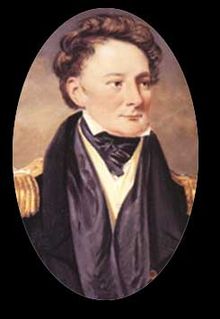Robert Heriot Barclay
| Robert Heriot Barclay | |
|---|---|
 |
|
| Born | 18 September 1786 Cupar, Fife, Scotland |
| Died | 8 April 1837 (aged 50) Edinburgh, Scotland |
| Allegiance |
|
| Service/branch |
|
| Years of service | 1798–1824 |
| Rank | Commander |
| Battles/wars | |
Robert Heriot Barclay (18 September 1786 – 8 May 1837) was a British naval officer who was engaged in the Napoleonic Wars, and its North American counterpart, the War of 1812.
He was born at Cupar, Fife, Scotland, the son of the Rev. Peter Barclay DD & Margaret Dudingston. He entered the Royal Navy in 1798, aged 11. In 1805 he was promoted Lieutenant, and took part in the Battle of Trafalgar aboard HMS Swiftsure. He was subsequently appointed the Second Lieutenant of the frigate HMS Diana, serving in the English Channel. In November 1809 he lost his left arm while leading a boarding attack on a French convoy.
After recovering, he continued to serve as lieutenant aboard several ships and smaller craft on the North American station. After war with America broke out, the Commander in Chief on the North American station (Admiral Warren), detached Barclay and two other lieutenants (Robert Finnis and Daniel Pring) to act as "Captains of Corvettes" on the Great Lakes. Barclay arrived at Kingston on Lake Ontario on 5 May 1813, and took charge of the squadron there with the acting rank of Commander. Ten days later he was superseded by Captain James Lucas Yeo. Yeo first offered the command of the detached squadron on Lake Erie to his friend, William Mulcaster. Mulcaster declined, probably because of the undermanned and underequipped state of the force, and the post was offered to Barclay, who quickly accepted.
...
Wikipedia
